This article was co-authored by Roy Nattiv, MD. Dr. Roy Nattiv is a Board-Certified Pediatric Gastroenterologist in Los Angeles, California. With over 20 years of experience he specializes in a broad range of pediatric gastrointestinal and nutritional illnesses such as constipation, diarrhea, reflux, food allergies, poor weight gain, SIBO, IBD, and IBS. He completed his pediatric residency at the Children’s Hospital at Montefiore, Albert Einstein College of Medicine in New York, and his fellowship at the University of California, San Francisco (UCSF). While at UCSF, he was a California Institute of Regenerative Medicine (CIRM) fellowship trainee and was awarded the North American Society for Pediatric Gastroenterology, Hepatology, and Nutrition (NASPGHAN) Fellow to Faculty Award in Pediatric IBD Research. Dr. Nattiv received his undergrad degree from the University of California, Berkeley, and his medical degree (MD) from the Sackler School of Medicine in Tel Aviv, Israel.
There are 9 references cited in this article, which can be found at the bottom of the page.
wikiHow marks an article as reader-approved once it receives enough positive feedback. In this case, several readers have written to tell us that this article was helpful to them, earning it our reader-approved status.
This article has been viewed 182,300 times.
In today's busy world, it is often difficult to eat a well-balanced diet. Taking a variety of types of vitamins in the form of supplements can help ensure that you are getting the recommended daily allowances. However, some individuals experience stomach upset from the vitamins they consume. The problem is especially evident in those who have sensitive stomachs or are taking certain types of vitamins or high doses. It is important to talk to your doctor and evaluate your daily routine to learn how to prevent stomach upset from vitamins.
Steps
Taking Vitamins Properly
-
1Take your vitamins with food. You shouldn't take vitamins on an empty stomach, especially if you're taking fat-soluble vitamins like A, D, E, or K. If you take them with a meal, the vitamins will be absorbed better and they'll cause less symptoms.[1]
- You should also avoid taking your vitamins before bed.[2]
-
2Experiment on the mode of vitamin. Try different forms of vitamins such as liquids or capsules and dosages to figure out what is less likely to cause your stomach to be upset.Advertisement
-
3Take the recommended dosage. To decrease the likelihood of stomach upset from vitamins, never take more than indicated on the label or that is prescribed by your doctor.
-
4Skip the caffeine while taking certain vitamins. Some medicines and vitamins interact with caffeine found in coffee or tea. Caffeine can also change the way your body absorbs vitamins. [3]
- Caffeine may interfere with the absorption of vitamins like calcium, vitamin D, Iron, vitamin B, and others.[4]
-
5Be consistent. You should take your vitamins on a regular schedule and at the same time of day. You can set an alarm to avoid forgetting or taking vitamins late. You can also take your vitamins immediately following dinner, if you eat a consistent time, to follow a consistent time table.
Gathering Information about Vitamins
-
1Ask your doctor if you need to take vitamin supplements if they upset your stomach. If you are eating a well-balanced diet, she might advise you that taking extra vitamins is not necessary. Consult your doctor about alternatives if the problem of stomach upset from vitamins persists.
-
2Determine the correct type and dosage of vitamins. This will help you not only avoid harming your stomach, but also best help your body. You should never take vitamins without first consulting your doctor.
-
3Know what to take and why. If your diet is consistent or you suffer from a chronic disorder, you may include vitamins to your daily routine to supplement what your body is missing.
- Vegetarians should consider taking iron daily. This provides protein otherwise found in meats.[5]
- People living without a lot of natural sunlight, or people who do not go outside regularly, should take Vitamin D. The sun naturally produces this vitamin, but people often lack enough. People who have office jobs or live in a climate without a lot of sunlight are especially at risk for Vitamin D deficiency.
- If your immune system is suppressed, or if it is flu and cold season, take Vitamin C. Vitamin C is a natural immune booster and can help your body resist illness.
Treating Vitamin Side-Effects
-
1Adjust your diet according to how you’re feeling. If your stomach is sensitive to vitamins, eating a balanced diet rich in lean meats, fish, fruit and vegetables will reduce your need to take them.
-
2Avoid taking vitamins on an empty stomach. If you have a sensitive stomach or you take vitamins and upset stomach occurs, always take them after you have eaten. Vitamins on an empty stomach can make the problem worse.[6]
-
3Settle stomach aches and cramps by eating bland foods. White bread and plain white rice are both foods that are easy on the stomach and digestion. Other foods suggested for a stomach ache or nausea include bananas and mint. [7]
-
4Soothe your stomach with peppermint. Though there is little scientific evidence to support peppermint as a remedy, there are many anecdotal reports of peppermint helping to soothe an upset stomach. Try brewing a peppermint tea, which may relax your stomach muscles.[8]
- Do not take peppermint if you have acid reflux or GERD.
- Other natural remedies thought to help soothe the stomach include ginger and caraway.
Expert Q&A
Did you know you can get expert answers for this article?
Unlock expert answers by supporting wikiHow
-
QuestionDoes drinking Ensure cause your stomach does make weird noises?
 Chris M. Matsko, MDDr. Chris M. Matsko is a retired physician based in Pittsburgh, Pennsylvania. With over 25 years of medical research experience, Dr. Matsko was awarded the Pittsburgh Cornell University Leadership Award for Excellence. He holds a BS in Nutritional Science from Cornell University and an MD from the Temple University School of Medicine in 2007. Dr. Matsko earned a Research Writing Certification from the American Medical Writers Association (AMWA) in 2016 and a Medical Writing & Editing Certification from the University of Chicago in 2017.
Chris M. Matsko, MDDr. Chris M. Matsko is a retired physician based in Pittsburgh, Pennsylvania. With over 25 years of medical research experience, Dr. Matsko was awarded the Pittsburgh Cornell University Leadership Award for Excellence. He holds a BS in Nutritional Science from Cornell University and an MD from the Temple University School of Medicine in 2007. Dr. Matsko earned a Research Writing Certification from the American Medical Writers Association (AMWA) in 2016 and a Medical Writing & Editing Certification from the University of Chicago in 2017.
Family Medicine Physician
-
QuestionHow can I keep my daily vitamin from upsetting my stomach?
 Roy Nattiv, MDDr. Roy Nattiv is a Board-Certified Pediatric Gastroenterologist in Los Angeles, California. With over 20 years of experience he specializes in a broad range of pediatric gastrointestinal and nutritional illnesses such as constipation, diarrhea, reflux, food allergies, poor weight gain, SIBO, IBD, and IBS. He completed his pediatric residency at the Children’s Hospital at Montefiore, Albert Einstein College of Medicine in New York, and his fellowship at the University of California, San Francisco (UCSF). While at UCSF, he was a California Institute of Regenerative Medicine (CIRM) fellowship trainee and was awarded the North American Society for Pediatric Gastroenterology, Hepatology, and Nutrition (NASPGHAN) Fellow to Faculty Award in Pediatric IBD Research. Dr. Nattiv received his undergrad degree from the University of California, Berkeley, and his medical degree (MD) from the Sackler School of Medicine in Tel Aviv, Israel.
Roy Nattiv, MDDr. Roy Nattiv is a Board-Certified Pediatric Gastroenterologist in Los Angeles, California. With over 20 years of experience he specializes in a broad range of pediatric gastrointestinal and nutritional illnesses such as constipation, diarrhea, reflux, food allergies, poor weight gain, SIBO, IBD, and IBS. He completed his pediatric residency at the Children’s Hospital at Montefiore, Albert Einstein College of Medicine in New York, and his fellowship at the University of California, San Francisco (UCSF). While at UCSF, he was a California Institute of Regenerative Medicine (CIRM) fellowship trainee and was awarded the North American Society for Pediatric Gastroenterology, Hepatology, and Nutrition (NASPGHAN) Fellow to Faculty Award in Pediatric IBD Research. Dr. Nattiv received his undergrad degree from the University of California, Berkeley, and his medical degree (MD) from the Sackler School of Medicine in Tel Aviv, Israel.
Board Certified Gastroenterologist
Warnings
- Never stop taking vitamins that your doctor recommended or prescribed without consulting with him or her. Discuss your upset stomach with your doctor and ask about ways to manage it.⧼thumbs_response⧽
- If you experience nausea or vomiting, this could be a sign that you have taken too much of a particular vitamin. If this occurs, see a medical professional immediately.⧼thumbs_response⧽
References
- ↑ Roy Nattiv, MD. Board Certified Gastroenterologist. Expert Interview. 14 October 2020.
- ↑ Roy Nattiv, MD. Board Certified Gastroenterologist. Expert Interview. 14 October 2020.
- ↑ https://www.ncbi.nlm.nih.gov/pmc/articles/PMC7397437/
- ↑ http://lpi.oregonstate.edu/mic/food-beverages/coffee
- ↑ https://kidshealth.org/en/teens/vegetarian.html
- ↑ https://health.clevelandclinic.org/get-nauseous-after-taking-vitamins-6-tips-to-make-them-easier-to-stomach/
- ↑ https://familydoctor.org/brat-diet-recovering-from-an-upset-stomach/
- ↑ https://www.mountsinai.org/health-library/herb/peppermint
- ↑ https://medlineplus.gov/ency/article/007478.htm
About This Article
If you experience stomach upset after taking vitamins, try switching the form of the vitamin you take. For example, a liquid form might be easier on your stomach than a pill or tablet. Additionally, make sure you take the correct dosage of your vitamin, since taking too much could cause unpleasant side effects. You can also help prevent stomach upset by taking your vitamins on a consistent schedule. Certain vitamins, such as calcium and vitamin D, interact poorly with caffeine, so avoid taking your vitamins with a cup of coffee. If taking vitamins on an empty stomach causes problems for you, try taking them with a nutritious meal or snack. To relieve any stomach upset that does occur, try eating some bland foods, such as bread, crackers, or bananas. Scroll down for more advice from our Medical co-author, including how to choose the right vitamin supplements for your needs.
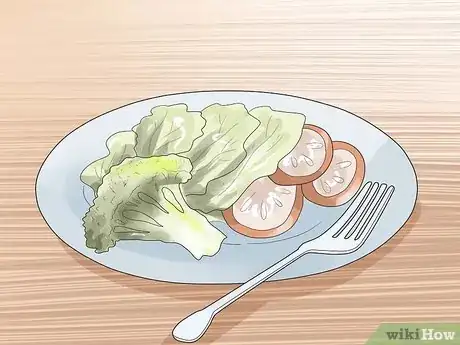

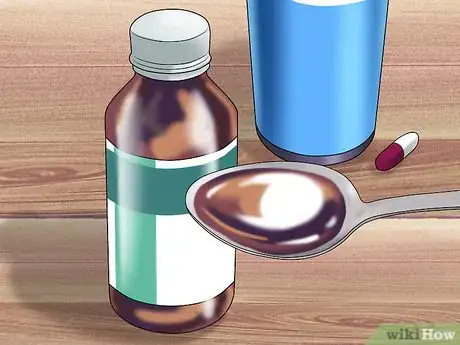
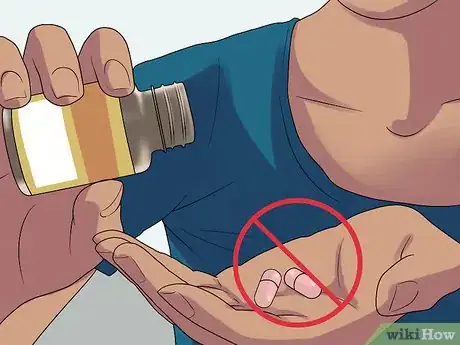

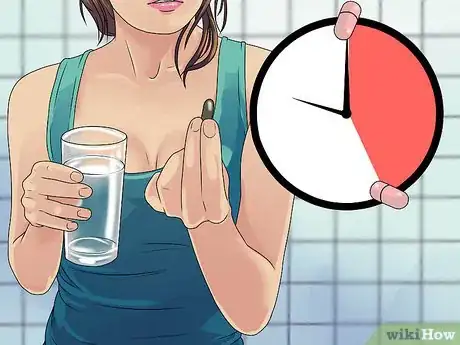
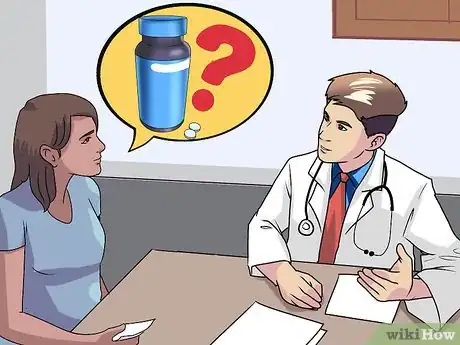

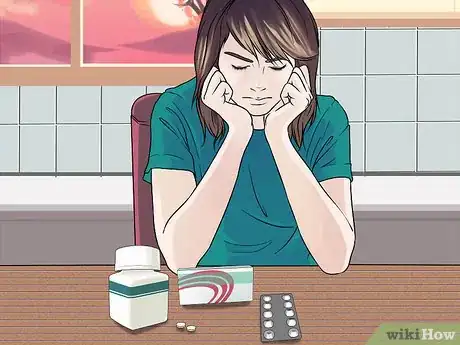



























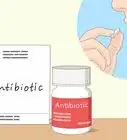





































Medical Disclaimer
The content of this article is not intended to be a substitute for professional medical advice, examination, diagnosis, or treatment. You should always contact your doctor or other qualified healthcare professional before starting, changing, or stopping any kind of health treatment.
Read More...